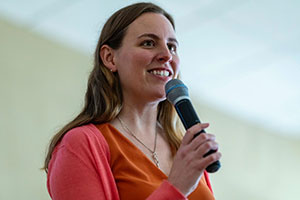
Double Your Impact for the Holidays
Double Your Impact for the Holidays
Your urgently needed year-end gift can go twice as far to provide care and support and accelerate Alzheimer's research this holiday season — and all year long. Show your giving spirit today during this 2x Match Challenge.
Donate NowHow Do Diversity and Stress Play A Role in Alzheimer’s Risk? A Young Researcher Is Searching for Answers
As an undergraduate student studying neurobiology at the University of Wisconsin-Madison, Dr. Megan Zuelsdorff became interested in the concept of stress. More specifically, she wanted to better understand how stress causes harm to the body. “I asked myself; ‘How does stress get under the skin – and what can we do about that’?” Megan says.
In pursuit of answering that question, Megan continued her studies in population health and epidemiology. She always knew that she wanted to work with older people, so she began focusing her research (and thesis) on stress and cognitive function in older adults.
 One thing Megan noticed was the lack of Alzheimer’s disease research in this area, especially research that focused on how stress and other social factors – in early, middle and later life – might contribute to differences in dementia prevalence.
One thing Megan noticed was the lack of Alzheimer’s disease research in this area, especially research that focused on how stress and other social factors – in early, middle and later life – might contribute to differences in dementia prevalence.
“I became aware of social disparities in Alzheimer’s and dementia risk and saw the really incredible work being done in this area, but not enough people doing it,” says Megan, now a research fellow with the University of Wisconsin-Madison’s Alzheimer’s Disease Research Center. “Seeing how race and socioeconomic status shape the environments we are exposed to and the resources we access, I felt really clearly that, given my interests, this might be an area where I can contribute to understanding cognitive aging and mitigating those disparities.”
In 2018, Megan received an Alzheimer's Association Research Fellowship (AARF) grant to expand her research into how social environments impact risk for Alzheimer’s disease in diverse populations. She had already collected social and biological stress data from 200 study participants with the help of a small grant from the National Institute on Aging (NIA), but the AARF grant doubled the size of the study, allowing her to engage more African-American and rurally-based participants from Wisconsin in this work. As a whole, this data will provide very early evidence for the development and reinforcement of individual and community resources that promote resilience in populations most impacted by Alzheimer's disease and dementia.
Both the research community and the general Wisconsin population involved in the study are excited, Megan says.
“I’ve received a lot of feedback from community members and have been able to adapt the protocol accordingly to account for stress and resilience-related constructs like caregiving, spirituality, identity formation and more,” says Megan. “Incorporating these measures into the project has been an exciting part of partnering with community members to build a better study.”
Thanks to the research funding from the Alzheimer’s Association grant, support from a local tribal association, and another grant from NIA, Megan has been able to expand her study again to focus on stress, resilience and cognitive aging in Native American elders, a seldom-researched community. She has also been promoted to a tenure-track faculty position in the University of Wisconsin-Madison’s School of Nursing.
“One of my most important goals has been to create an inclusive and responsive research program. It’s been humbling and incredibly gratifying, partnering with communities across the state. I can't even express how much they’ve contributed to the program we’re building. Doing this research with the help of the Alzheimer’s Association has been foundational and rewarding in every way.”
About Megan: Dr. Megan Zuelsdorff received her Ph.D. in Population Health Sciences at the University of Wisconsin-Madison in 2016 and completed postdoctoral training in the UW’s Health Disparities Scholars Program and Center for Demography of Health and Aging. Dr. Zuelsdorff's grant is sponsored by NARFE.
Megan is a mother of two who is spending her summer days kayaking in the sunshine with her family.
Related articles:
Genetics and Alzheimer’s
Clinical Trials
Research
